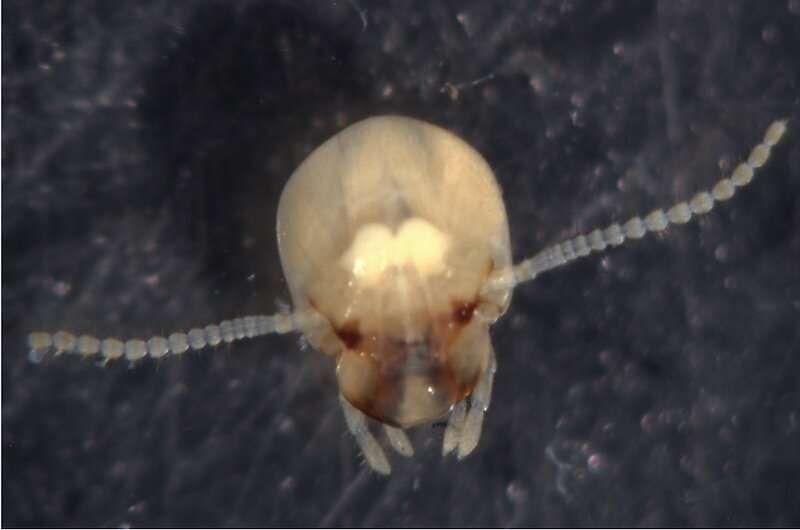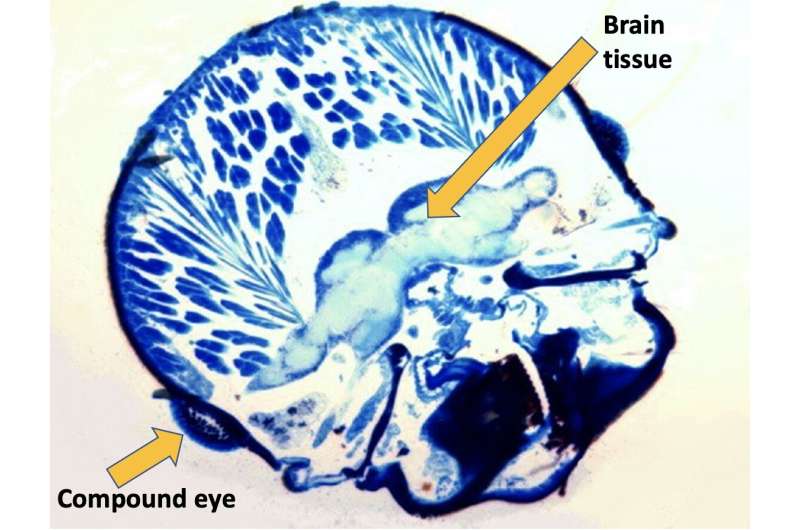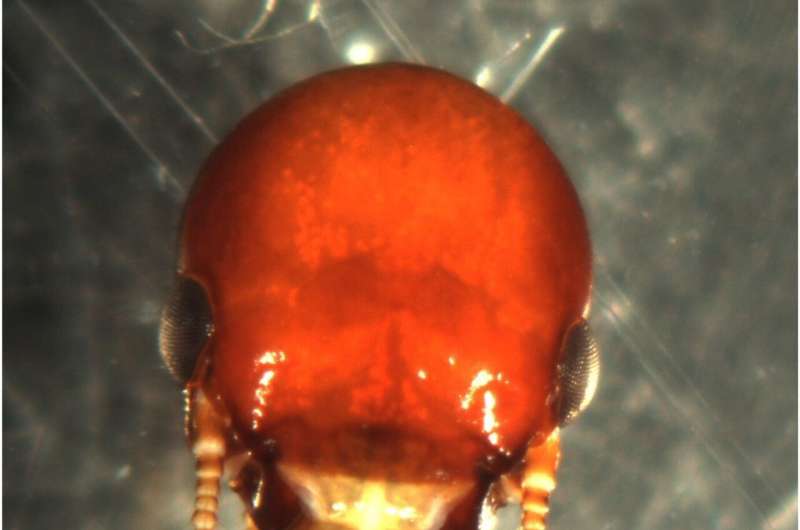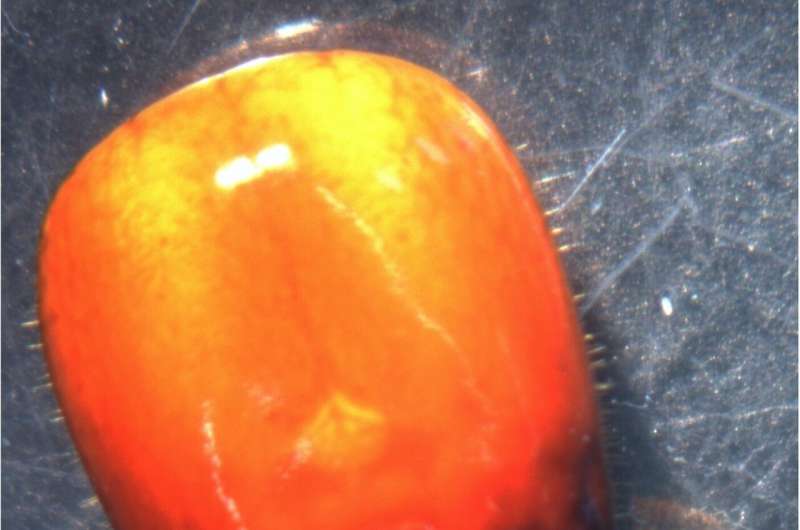
Dampwood termite worker head capsule and brain. Credit: Sean O'Donnell, Drexel University
Posted on 10/21/2021 2:11:41 AM PDT by LibWhacker

Dampwood termite worker head capsule and brain. Credit: Sean O'Donnell, Drexel University
New research on dampwood termites (Zootermopsis angusticollis and A. nevdensis) shows select members of the colony will experience brain changes in anticipation of cognitive demand.
In a dampwood termite colony only a select few will, quite literally, see the light. The insects are unique due to their mating flights and the adaptability of their role within the colony, which is based on the overall needs of the group. King and queen termites must leave the nest and are the only members to go outside—briefly —to partner off and tunnel into a new location to start another colony. Researchers at Drexel University investigated how this group of individuals, who are destined to leave the nest, evolve differently in the brain region that processes vision.
The new study, published in The Science of Nature, measured developmental differences in the relative sizes of visual processing brain regions, called optic lobes, among dampwood termite castes to test whether optic lobe investment matches caste differences in exposure to visually complex environments.
"The term 'caste' when applied to insect societies—is the idea that you have specialized individuals that play different roles," explains Sean O'Donnell, Ph.D., a professor in the College of Arts and Sciences and lead author of the study. O'Donnell's team used developmental knowledge of the dampwood termites to make predictions about their needs for different brain tissues depending on their role. The researchers found that the insect's investment in brain regions matched their cognitive demands—but the changes in their brain happened before the change in cognitive demand.

Stained thin-section through the head capsule of a dampwood termite, showing eye and brain structures that were measured for this study. Credit: Sean O'Donnell, Drexel University
"Neuroecology explores how brains evolve and develop with the idea that the brain structure of an individual is going to be shaped by the demands it faces," says O'Donnell. "Learning that the kings and queens have different visual investment is important, but not super surprising—what is special was our ability to identify and measure the developmental stage that is the precursor to an individual molting into a king or queen."
While the first three stages of termite life do not tend to vary much, when nymphs reach the fourth stage they can molt into a number of different forms. These different forms play different roles in the colony, including the possibility to become a winged reproductive king or queen, worker, solider or a wingless reproductive.
"Some nymphs have tiny developed wing pads—this stage does not leave the nest, they are not technically a king or queen yet, but changes in the brain architecture in that stage are happening and setting up the brain for the capacity to be used in a light bright environment. The brain change happened earlier in development than needed," says O'Donnell. "This is surprising and exciting, as this kind of anticipatory brain development is not seen very often, as well as the fact that, with some accuracy, we can predict the developmental future of an individual and it looks as though the brain is tracking that trajectory, although it's not being used yet."

Head capsule of a "king" reproductive dampwood termite. Credit: Sean O'Donnell, Drexel University
This evidence shows that some dampwood termites are experience-expectant, meaning changes in the brain are happening before they are needed. Honeybee brains have also demonstrated some experience-expectant plasticity—but overall, this occurrence is rare.

Head capsule of a dampwood termite soldier. Note the massive mandibles (mouthparts),used in defense of the colony. Credit: Sean O'Donnell, Drexel University
Looking forward, the team wonders whether or how the neural tissue investment may be offset prior to accruing cognitive payoffs. O'Donnell suspects anticipatory brain growth may be favored when the brain needs to be primed to respond to new challenges on short notice. In the case of dampwood termites, mating flights could occur soon after Kings and Queens reach adulthood.
Our tax money at work?
Just wondering
I have always heard of Queens of insect colonies, bees, ants, wasps, but never a colony King until here. Interesting that there are apparently two leaders.
Yep. The original paper included this... “This work was funded by Drexel College of Arts and Sciences and NSF grants IBN 0347315 and IOS 0923680.”
In this case, I approve, within reason. I mean, it’s not worth a trillion dollars. But discovering that brains can anticipate the need for greater capability, then respond in a way that produces that new capability is pretty amazing, and worth knowing, imho!
how the neural tissue investment may be offset prior to accruing cognitive payoffs.
Sorta like a dumblecrat looking at a wallet.
That explains so much...
Has Biden been told? Even this small glimmer of hope would be appreciated, I’m sure.
Vital research into the liberal hive mind.
Maybe this research could help us to understand why democrat brains never fully develop either.
Bees, wasps, and ants are a different order of insect (Hymenoptera). Termites require the king to stick around to fertilize the queen because termite queens cannot store sperm as efficiently as bee, wasp, and ant queens. With the Hymenoptera insects the males only need to fertilize the queen once, so they do not follow her to her new nest nor are they allowed back in to their old nest after their mating flight because they do no work.
The fact that Hymenoptera insects pupate like butterflies and moths while termite nymphs gradually molt into their adult form shows that termites have been around longer than Hymenoptera. So bees, wasps, and ants are like Social Insects 2.0.
I did not know that about the different order of insects and how they produce.
I find that very interesting.
ok, sign me up for an enhanced brain
although, as I have hanging on my office wall sign,
“And furthermore, my son, be admonished: of making many books there is no end; and much study is a weariness of the flesh.”
(Eccles. 12:12)
Disclaimer: Opinions posted on Free Republic are those of the individual posters and do not necessarily represent the opinion of Free Republic or its management. All materials posted herein are protected by copyright law and the exemption for fair use of copyrighted works.